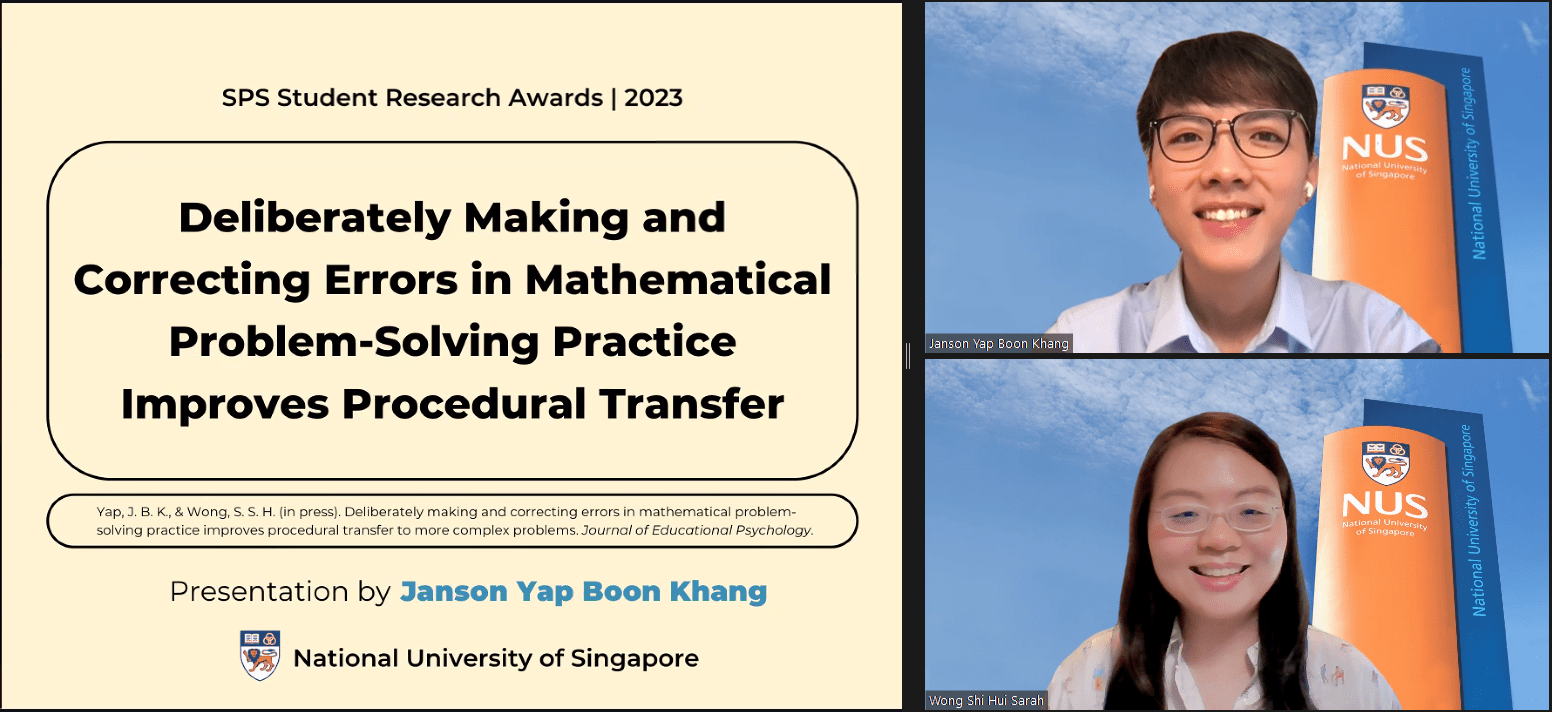
We are proud that Janson Yap Boon Khang (pictured, top) from NUS Psychology has clinched two prestigious national-level awards at the Singapore Psychological Society (SPS) Student Research Awards 2023—the Fred Long Award for Research Excellence (Overall Best Submission) and Best Undergraduate Research. The award-winning work, “Deliberately Making and Correcting Errors in Mathematical Problem-Solving Practice Improves Procedural Transfer”, was based on Janson’s independent research project mentored by Dr. Wong Shi Hui Sarah (pictured, below).
The Student Research Awards (SRA) is an annual initiative of the SPS to recognise budding researchers and celebrate outstanding research done in Singapore. Open to all tertiary educational institutions in Singapore and across all areas of psychology, the Awards are presented to the top entries in the diploma, undergraduate, and postgraduate categories, respectively.
In addition, the Overall Best Submission across all three categories is conferred the prestigious Fred Long Award for Research Excellence, which honours the decades of service to our Singapore community by the Founder President and Honorary Fellow of the Singapore Psychological Society, Dr. Fred Long Foo Yee. This distinction is awarded to a single psychology student in Singapore for outstanding research that demonstrates exceptional rigour and practical significance.
This year’s edition of the SRA was held virtually on 9 December 2023, during which shortlisted finalists presented their research.
Besides bagging the top honours as both the winner of the Undergraduate Research Category and Overall Best Submission at the SPS SRA 2023, Janson’s research is now in press at the leading publication, Journal of Educational Psychology.
In two experiments, Janson showed that deliberately committing and correcting procedural errors during math problem-solving practice improves students’ transfer when solving novel, more complex problems. Deliberate erring was not only more effective than errorless repeated practice, but also finding, explaining, and correcting others’ errors.
Dr. Sarah Wong commented, “Learning from our errors is crucial for success but is often easier said than done. In this study, we found that deliberately making and correcting errors is an effective way to enhance problem-solving and transfer in mathematics. This discovery challenges traditional views of avoiding errors in learning, and attests to the wisdom of intentionally embracing errors when the stakes are low.”
Reflecting on his research experience, Janson shared:
It all started in my third year of undergraduate studies when I decided to pursue an independent research project to delve deeper into the wonders behind human learning and cognition. Through the project, I have learnt to truly appreciate the value of research—that is to ask and answer meaningful questions that will create new knowledge for the betterment of mankind. Research is a challenging yet fulfilling endeavour and there were many instances when I felt like giving up. Yet, I constantly reminded myself that if I persevered a little longer, one day I will be able to translate my findings into practical impacts in the real world.”
On winning two national-level awards, Janson said, “This is an achievement that I certainly did not dream of but am definitely very proud of. And all of these would not have been possible without my mentor, Dr. Sarah Wong. I am very thankful to have learnt under the guidance of Dr. Wong and for all the invaluable advice and unwavering support she has given me. I count myself extremely fortunate to have crossed paths with Dr. Wong and I look forward to working closely with her on my Honours Thesis and even beyond.”
Dr. Wong added, “Throughout the project, Janson demonstrated strong dedication and perseverance in overcoming challenges to execute not just one, but two rigorous experiments. We are very proud of Janson for competently undertaking this research that offers important implications for theory and educational practice.”
We heartily congratulate Janson and Dr. Wong!
Read more about the award-winning research below:
Abstract
How can students effectively learn and transfer mathematical procedures to solve new problems? Here, we tested the effects of deliberately committing and correcting errors during mathematical problem-solving practice on transfer of the learned procedures. In two experiments, university students were instructed on mathematical algorithms (synthetic division and matrix multiplication) and solved practice problems during open-book study. Learners were then tested on flexibly adapting the algorithms to solve novel problems that were structurally more complex or embedded in “real-life” scenarios (i.e., mathematical word problems). Deliberately committing and correcting procedural errors during problem-solving practice yielded better transfer than errorless repeated practice (Experiment 1) or studying incorrect worked examples by finding, explaining, and correcting the errors that one’s peers had made (Experiment 2). Yet, most learners failed to accurately predict or recognize the advantage of deliberate erring even after the test, instead misjudging this technique as less effective. This suggests that experiencing the benefit of deliberate erring is insufficient to dispel learners’ metacognitive illusion that generating errors is not helpful for their learning. Overall, our results point to the critical role of firsthand errors in mathematical learning. Relative to avoiding errors or even studying others’ errors and juxtaposing them with the correct solutions, guiding learners to deliberately commit and correct their own errors after instruction improves mathematical problem-solving and transfer.
Reference
Yap, J. B. K., & Wong, S. S. H. (in press). Deliberately making and correcting errors in mathematical problem-solving practice improves procedural transfer to more complex problems. Journal of Educational Psychology.

